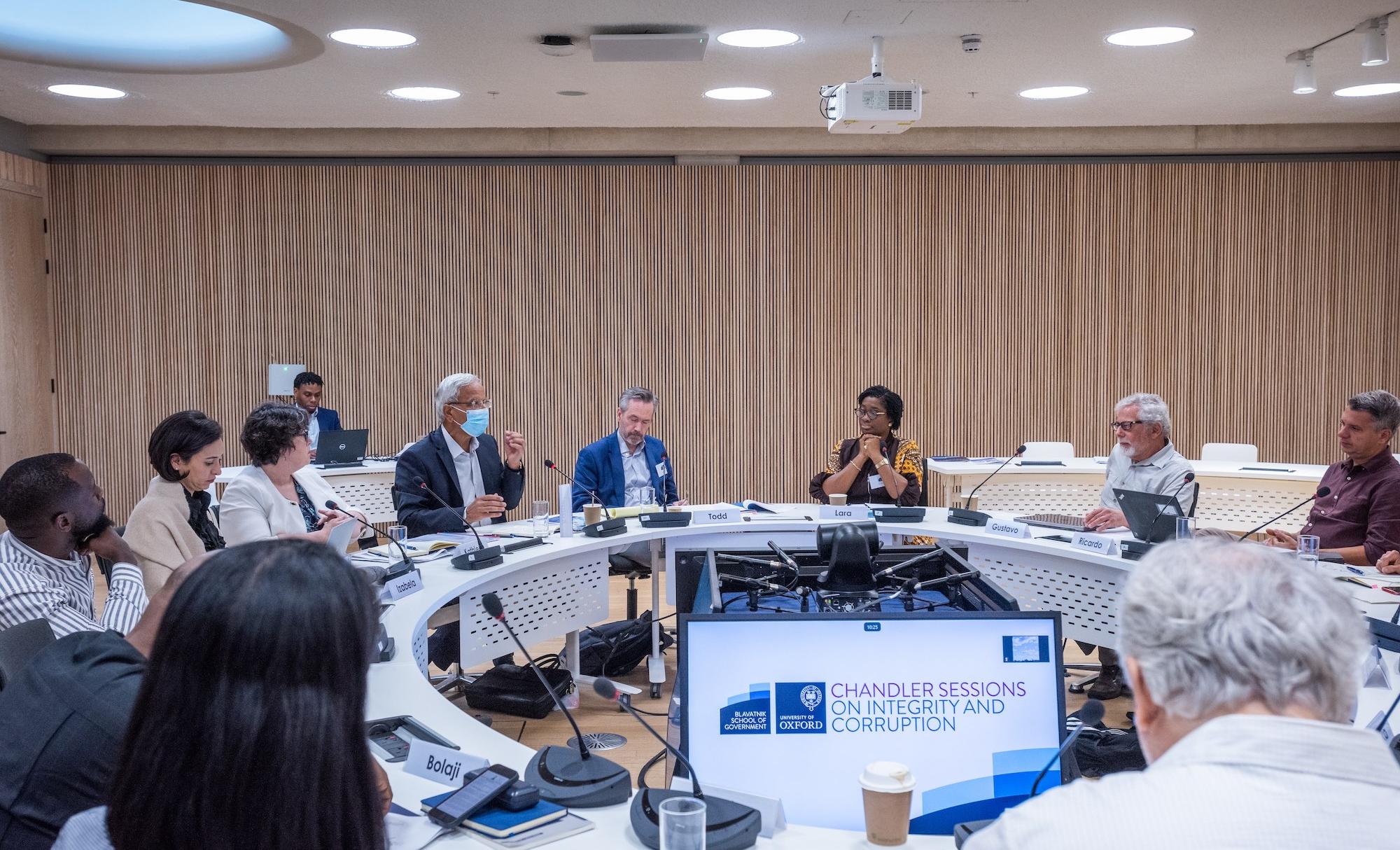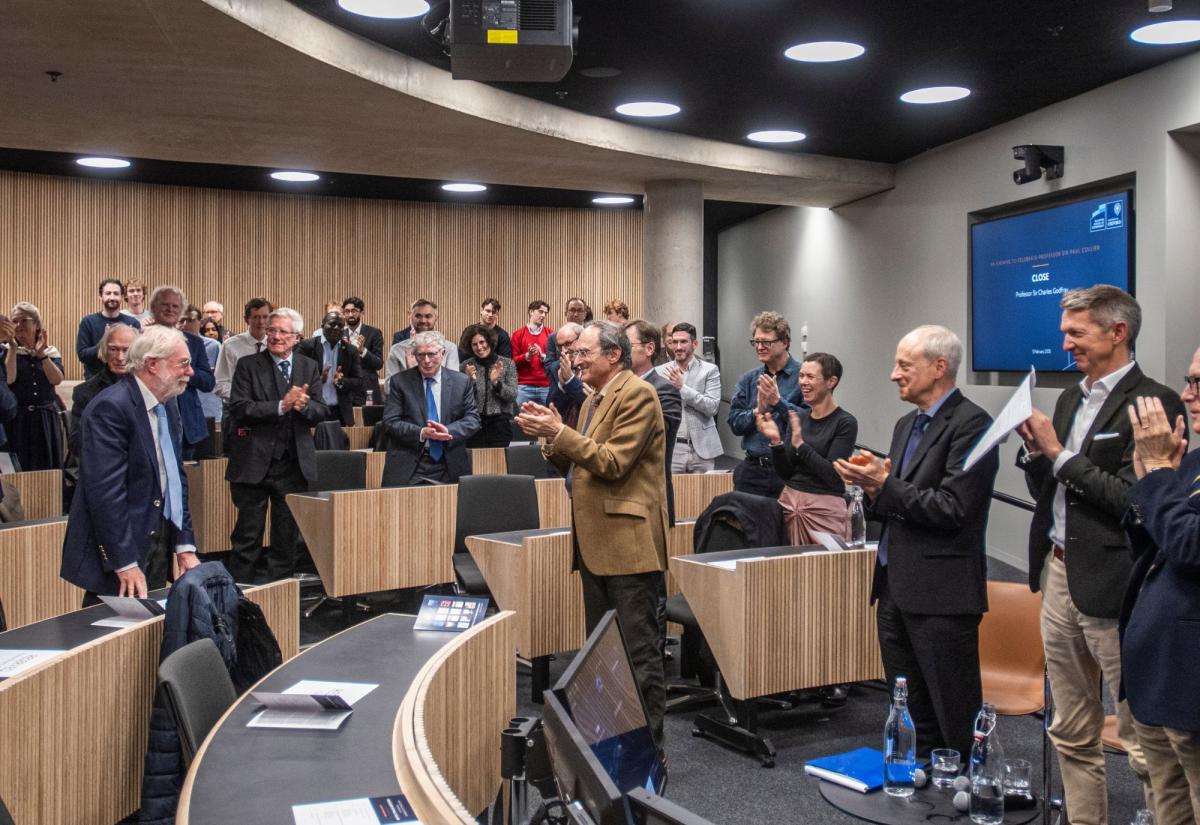
A unique group of global experts including leading academics, journalists and veteran directors of prosecution today called for a reset on anti-corruption efforts, as the first in a groundbreaking series of papers highlighting new strategies to strengthen integrity in government institutions and dislodge entrenched corruption was published.
The Chandler Papers have been written by the members of The Chandler Sessions on Integrity and Corruption, a group brought together by the Blavatnik School of Government at the University of Oxford to focus on issues of corruption worldwide.
The Papers, which will be published over the next twelve months, analyse current practices employed to root out corruption, the tools available to penalise wrongdoers and the indicators used to measure corruption. They examine compliance programmes and anti-corruption policies to address, for example, sexual corruption, ask why leading anti-corruption organisations is so fraught, and explore aspects of extraterritoriality in global anti-corruption campaigns. Each Chandler Paper will set out strategies for managing the challenges to force corruption out of societies, and introduce a collaborative approach to build integrity and trust in institutions.
The first Paper in the series is titled ‘The World’s Anti-Corruption Efforts Need a Reset’ and explains why prosecution is not the only answer to meeting the challenges of corruption.
It reviews notorious corruption cases, such as the Mani Pulite (“Clean Hands”) investigations in Italy in the 1990’s and the prosecution of Siemens in the 2000’s, to identify key lessons.
Prosecution alone won’t solve corruption
The authors, Shamila Batohi, National Director of Public Prosecutions in South Africa and Christopher Stone, Professor of Practice of Public Integrity at the Blavatnik School, conclude that independent prosecution services can only play their true role in the fight against corruption as partners in wider strategies that build strong cultures of integrity resistant to corruption in each government institution and office. Building those strong cultures of integrity requires a strategy reset: tightening the focus on individual institutions, departments, and agencies rather than dispersing attention across a nation as-a-whole
The Paper sets out a blueprint to encourage investigators and prosecutors to partner with reform-minded leadership in individual ministries, departments, and agencies to establish strong cultures of integrity resistant to corruption in every public institution:
- Build integrity department by department, and measure progress; power corrupts in every country, but it never corrupts everyone or every department. Developing indicators of corruption and integrity at the level of ministries, departments, bureaus, and smaller units of government gives both law enforcement officials and institutional leaders practical tools to target scarce resources and measure progress.
- Reconcile institutional independence with interdependence. Enforcement institutions must have the independence to collaborate effectively with reformers, while protecting themselves against compromised would-be partners.
- Delegate enforcement authority to smaller, multidisciplinary teams makes it harder for outsiders to control the work, but also allows teams to specialise on the individual institutions where they can support change; this increases the chances that some of those teams will succeed.
- Put the public back in public integrity with new ways to engage the public - community groups, civil society organisations, and business - as active participants in the turnaround process.
Professor Stone said:
“The Chandler Papers aim to start the next wave of innovation in anti-corruption work globally. Every paper is co-authored by a senior official who really understands corruption and the real work required to fight it, especially when corruption fights back. These veteran officials are joined by some of the most creative scholars and journalists investigating corruption today. The Chandler Papers should be like a lightning storm, energising the whole field.”
Notes to editors
Read Chris Stone's keynote speech at the at the opening session of the National Anti-Corruption Advisory Council’s (NACAC) National Dialogue on building a corruption-free South Africa.
The Chandler Sessions on Integrity and Corruption is a three-year project that convenes a consistent group of senior leaders of anti-corruption institutions together with a small group of academics and expert journalists in regular meetings at the Blavatnik School of Government, University of Oxford. The Sessions work collaboratively, share experiences, debate the effectiveness of policy responses, and develop a set of new strategies for strengthening integrity in government institutions and dislodging entrenched corruption.
The Chandler Sessions on Integrity and Corruption are a joint undertaking with University College, Oxford. The Sessions are generously supported by the Chandler Foundation.
The Session members are:
- Kamal Ayadi, Founding Chairman of the Global Infrastructure Anti-Corruption Center
- Shamila Batohi, National Director of Public Prosecutions, South Africa
- Monica Bauhr, Professor at the University of Gothenburg
- Martha Chizuma, Director-General of the Anti-Corruption Bureau, Malawi
- Izabela Corrêa, Secretary for Public Integrity at the Brazilian Office of the Comptroller General
- Javier Cruz Tamburrino, Compliance Officer of the Chilean Central Bank, Chile
- Todd Foglesong, Lecturer and Fellow-in-Residence Munk School, University of Toronto, Canada
- Gustavo Gorriti, Founder and Editor of IDL-Reporteros, Peru
- Jin-Wook Kim, Director of the Corruption Investigation Office for High-Ranking Officials, South Korea
- John-Allan Namu, CEO and Journalist at Africa Uncensored, Kenya
- Bolaji Owasanoye, Chairman of the Independent Corrupt Practices and other Related Offences Commission, Nigeria
- Anna Petherick, Associate Professor at the Blavatnik School of Government, United Kingdom
- Kathleen Roussel, Director of the Public Prosecutions, Canada
- Agung Sampurna, Former Chairman of the Audit Board of the Republic and Lecturer at the University of Indonesia, Indonesia
- Christopher Stone, Professor of Practice of Public Integrity at the Blavatnik School
- Tanka Mani Sharma, Auditor General, Nepal
- Lara Taylor-Pearce, Auditor General, Sierra Leone



